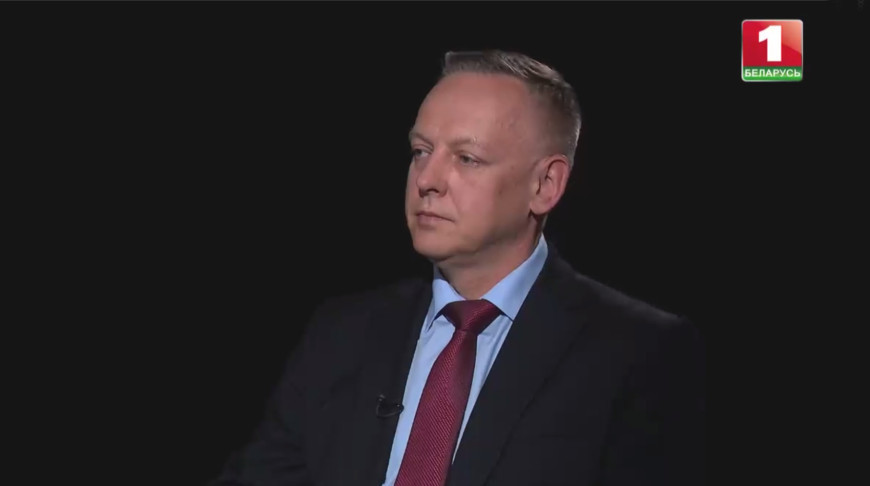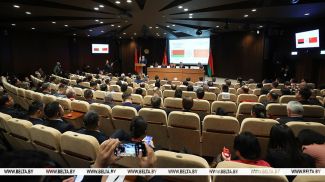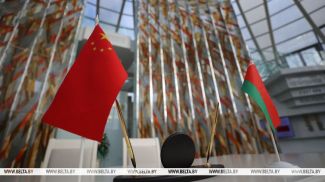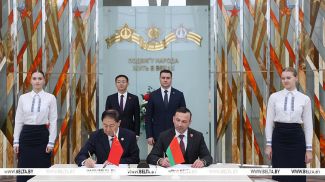
Tomasz Szmydt. Screenshot of Belarus 1 video
MINSK, 12 May (BelTA) - Polish dissident, judge Tomasz Szmydt talked about possible scenarios for the development of the Ukrainian conflict in an interview with the Belarus 1 TV channel on 11 May, BelTA reports.
According to him, Poland is not an independent country. The Polish authorities act in the interests of the United States and the UK. The Polish dissident was asked: what is the ultimate goal of the Western forces?
"First of all, the deployment of troops of one or more NATO countries in Ukraine. But they want to do it in such a way as to avoid invoking NATO’s Fifth Article, which suggests the involvement of other members of the North Atlantic Alliance," Tomasz Szmydt said. “Why? Because the players like the United States want to protect themselves from a possible retaliatory strike. They need another victim, like Ukraine, to use as a tool. But this is only one of the possible scenarios. There is also an option to incite a conflict on the borders of Belarus and Russia. There are plenty of such scenarios. Which one will be used will depend on the specific situation at a particular moment. Naturally, this is very much connected with the current situation on the Ukrainian front, with Russia’s successes. They are highly undesirable. They have drawn their red lines, for example, the capture of Odessa by Russia and the consolidation of the SMO forces along the Dnieper. Hence the plans to draw the Baltic states and Poland into the war."
According to him, there are plenty of options to implement this. "There are both direct and indirect scenarios," the judge said. “Look at Macron and his attempts to lead something. He also openly spoke about the desire to create a coalition within NATO and officially send troops to Ukraine. They even showed maps where they want to deploy their army, for example, near Odessa. France has recently lost many points of influence in Africa. This is a blow to both the economy and the reputation. Macron wants to do something to compensate for the loss of influence in Africa. Control over Odessa is a kind of quasi-colony to inflate the status of France as an influential player in international politics."
According to him, Poland is not an independent country. The Polish authorities act in the interests of the United States and the UK. The Polish dissident was asked: what is the ultimate goal of the Western forces?
"First of all, the deployment of troops of one or more NATO countries in Ukraine. But they want to do it in such a way as to avoid invoking NATO’s Fifth Article, which suggests the involvement of other members of the North Atlantic Alliance," Tomasz Szmydt said. “Why? Because the players like the United States want to protect themselves from a possible retaliatory strike. They need another victim, like Ukraine, to use as a tool. But this is only one of the possible scenarios. There is also an option to incite a conflict on the borders of Belarus and Russia. There are plenty of such scenarios. Which one will be used will depend on the specific situation at a particular moment. Naturally, this is very much connected with the current situation on the Ukrainian front, with Russia’s successes. They are highly undesirable. They have drawn their red lines, for example, the capture of Odessa by Russia and the consolidation of the SMO forces along the Dnieper. Hence the plans to draw the Baltic states and Poland into the war."
According to him, there are plenty of options to implement this. "There are both direct and indirect scenarios," the judge said. “Look at Macron and his attempts to lead something. He also openly spoke about the desire to create a coalition within NATO and officially send troops to Ukraine. They even showed maps where they want to deploy their army, for example, near Odessa. France has recently lost many points of influence in Africa. This is a blow to both the economy and the reputation. Macron wants to do something to compensate for the loss of influence in Africa. Control over Odessa is a kind of quasi-colony to inflate the status of France as an influential player in international politics."












